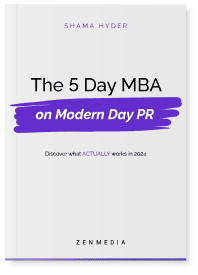If there’s one question that Zen’s founder and CEO, Shama Hyder, gets asked over and over, it’s this one: “How do I get my first job in marketing?” (In fact, she gets asked so often that she wrote an entire Forbes article to answer it.)
Digital marketing as a field is experiencing a high demand for professionals, so it’s a good time to be looking to enter the industry. But if you’ve got no experience—if you’re just out of college, or trying to switch careers, say—where do you start?
We’ve put together a list of tips to help you get on the fast track to landing that first digital marketing job, no matter where you are in life or career.
1. Start by creating your own free curriculum.
There’s so much free content available on digital marketing and all its many specializations, that you can get a strong start to your marketing education without leaving your home or paying a dime.
The important thing is to seek out high-quality websites and courses. The Content Marketing Institute offers excellent resources, from short articles and how-tos, to videos, reports, and research insights.
Other good providers of informative, free digital marketing information are Neil Patel and Jay Baer’s Convince and Convert. If you’re willing to put in some time, you’ll truly be amazed at just how much you can learn.
2. Take the Hubspot Inbound Marketing certification course.
Hubspot is one of the worldwide leaders when it comes to marketing and sales education—and believe it or not, they’re all free, as well.
For a good overview, we recommend starting with the Inbound course, which will give you the foundation you need to understand the goals, purpose, and general principles behind digital marketing (which operates almost entirely on the idea that you need to bring people to your brand through engaging content, rather than interrupt them with ads, which is the traditional, “outbound” method).
After you’ve mastered the inbound course, seek out other courses that pique your interest on topics like SEO, content marketing, and social media.
3. Read a few of the most recent books on digital marketing.
Because digital marketing as a field evolves so rapidly, it’s hard to find any one text that will sufficiently explain the landscape. That’s why our CEO generally offers a few recommendations, including these (taken from Hyder’s Forbes article):
- New Rules of Marketing and PR by David Meerman Scott. Scott’s book will help you grasp how the marketing world has changed and evolved.
- Blue Ocean Strategy by Renée Mauborgne and W. Chan Kim. This isn’t about marketing as much as it is about differentiating—which, at the end of the day, is what gets your product or service noticed. It’s how you create buzz in an ever-busier world, and if you can do that, then you have a future in marketing.
- The Zen of Social Media Marketing (4th edition) and Momentum by Shama Hyder. Start with the Zen of Social Media, because it is meant to be a primer and it is already used to teach social media in college classes around the world. Momentum is the next book which covers more principles of digital marketing in today’s landscape. It’s definitely for a more intermediate to advanced audience.
4. Take “the briefcase approach.”
Ramit Sethi’s “briefcase approach” is simple but so effective: basically, when going into an interview, you bring along a proposal you’ve created that details the problems in the business you’ve been able to identify, as well as—and this is the critical part—how you would solve them.
This can be especially effective if you’re interviewing for a job that you don’t have tons (or any) experience for because it allows you to showcase your skills before your potential employer expects it. What’s more, it will set you apart from the rest of the people interviewing for the job, because most people simply won’t put in the work.
5. Talk to your colleagues in the marketing department.
If you work at a large company with its own marketing department, reach across the aisle, as it were, and start relationships with some of your colleagues there.
This can be as simple as sending an email introducing yourself, and saying you’re interested in their work and would like to learn more about what they do. You can propose a quick coffee meeting, or lunch if they seem receptive.
By getting on the department’s radar, you can open up opportunities to work more closely with them, learn from them, and even be first in line to interview for a marketing position, should one open up.
6. Search your LinkedIn contacts for people who work or have worked in marketing.
Networking, of course, is the golden rule for finding a new job or switching careers, and LinkedIn is one of the easiest ways to both keep in touch with and grow your network.
Take some time to search your contacts for those who’ve worked in marketing at some point, whether that’s currently or in the past. Identify those whom it would make sense to reach out to, and let them know that you’re planning a career change and would like to hear about what they’ve been doing. As long as you go into the relationships with an open mind and ready to reciprocate however you’re able, you’re bound to gain something positive from the interactions. In addition, if you’re looking to plan a career change after your 30s, this is an excellent way to get started
7. Offer your services to a nonprofit for free.
There’s no better way to gain experience than by offering your help to someone who really needs it—and chances are, there’s a nonprofit organization near you who fits that bill.
Nonprofits run on extremely lean budgets, and often have one person performing multiple jobs. Get in touch and ask if you can sign on as a volunteer to help with marketing. You’ll learn plenty, and help out a good cause while doing it.
8. Learn Google Analytics and Google AdWords.
Google Analytics and AdWords are still two of the most popular tools when it comes to digital marketing, and learning them can only help you. Check out the Google Academy for Ads and you’ll find certifications and training modules that will help you grow your knowledge and showcase your professionalism.
9. Focus in on one aspect of digital marketing—and learn it really well.
Because digital marketing is such a massive field, it pays to focus in on a specialization (after you’ve established a strong foundation, that is).
Think social media is where your forte lies? Learn everything you can about it, from how to run effective social ads to how to track KPIs. If content marketing is more your thing, take a Content Marketing Institute course, start a blog, and hone your writing skills.
Specializing will not only help you develop those skills more quickly, as you’ll be taking a deep dive into just one area at a time, rather than many. It will also help you differentiate yourself from others in the space.
10. Offer your services as a freelancer.
Rather than seek out a full-time job in digital marketing right from the get-go, consider offering your services as a freelancer first.
This way, you can take on small, manageable projects, like setting up an ad campaign or writing a few blog posts, to test your skills, see where you’re confident, determine what you need to improve, and just as importantly, see whether you truly do enjoy marketing! Upwork is one place to start finding freelance jobs, but it’s a good idea to use word-of-mouth, too. See whether your own company has a marketing-related need that no one’s had time to fill, and ask friends and colleagues to offer your name if they hear of someone needing marketing help.
11. Brush up on your math skills.
Marketing, like so many things, is part art, and part science—and the science part will benefit greatly if you brush up on some basic math skills. With the importance today of A/B testing, clickthrough rates, conversion rates, and more, you need a healthy grasp of mathematics to interpret data and apply it in the most efficient way possible.
12. Join a community of marketers, either offline or online.
Having a strong community of people who are doing what you want to be doing, as well as those who are on a similar journey to yours, can only help you.
Start by joining your local Chamber of Commerce—that can be a good entry point for developing new business relationships with other local professionals and identifying local groups, gatherings, or forums for those in the marketing industry.
Meetup is another excellent resource for finding real-life get-togethers for marketing professionals.
13. Never stop learning.
Digital marketing changes fast, and if you don’t go into the industry with a learning mindset, you’ll soon find that the skills you’ve developed are no longer the latest and greatest. Take every opportunity you can to learn what’s new, what’s next, and what’s most effective. Read publications like Forbes, Inc, and AdAge to stay on top of marketing and business news.
Entering the field of digital marketing can be daunting, whether you’re a recent college grad or a seasoned professional switching careers. Taking the time to go slowly, network, and learn what you need to know before trying to land a full-time job will help you go into your new position both confidently and professionally.







